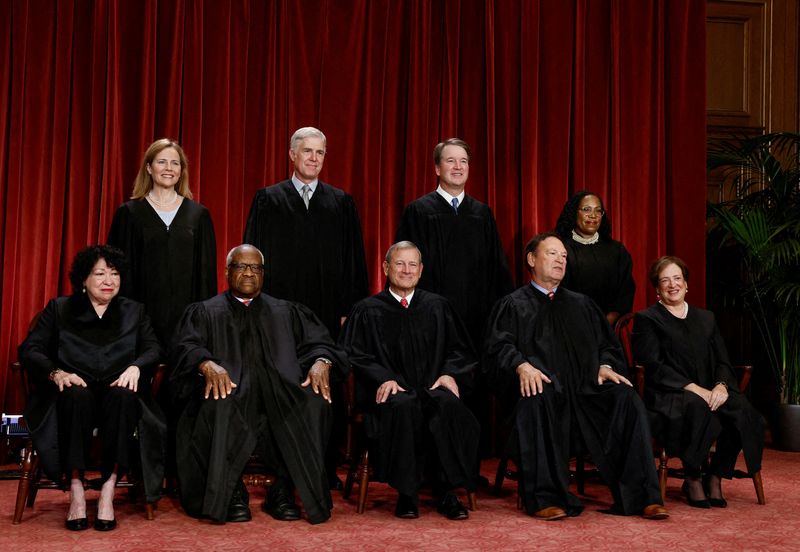By Andrew Chung
(Reuters) - The U.S. Supreme Court acted unanimously when it sided with Donald Trump and prevented states from barring candidates for federal office from ballots based on a constitutional provision concerning insurrection.
But despite the 9-0 outcome, the nation's highest judicial body clearly remained deeply divided, just as it has been in major cases in recent years on abortion, guns and federal agency powers, with justices differing on their reasoning in Monday's decision and sniping at each other over their choice of words.
With another big case involving Trump just around the corner - arguments are set for next month in his claim of presidential immunity from prosecution - the nine justices are continuing to find unity elusive in the biggest legal questions they are asked to decide for a deeply polarized country.
Four of the nine justices - its three liberal members and its newest member - disagreed with the rest of the court about decision, saying the outcome powered by five conservative justices went further than necessary.
"There's definitely disagreement as to the reasoning behind the results," said Ohio State University election law expert Edward Foley.
"The conclusion is there's more disagreement at the court than is desirable in a case involving the presidential election," Foley added.
Colorado's top court found that the U.S. Constitution's 14th Amendment disqualified Trump, running to regain the presidency, from again holding public office and barred him from its ballot for Tuesday's Republican primary, finding he had engaged in an insurrection for his actions involving the 2021 attack on the U.S. Capitol.
The 14th Amendment's Section 3 bars from office any "officer of the United States" who took an oath "to support the Constitution of the United States" and then "engaged in insurrection or rebellion against the same, or given aid or comfort to the enemies thereof."
Trump appealed the state court's ruling. The Supreme Court, which has a 6-3 conservative majority, ruled in his favor. The court determined that only Congress can enforce the 14th Amendment's Section 3 against federal officeholders and candidates.
It ruled that barring state enforcement avoids a "patchwork" of candidates being declared ineligible in some states but not others. On that point all the justices agreed.
'CRYING OUT FOR JUDICIAL RESTRAINT'
But liberal Justices Sonia Sotomayor, Elena Kagan and Ketanji Brown Jackson, as well as conservative Justice Amy Coney Barrett, in separate opinions faulted the other five justices for going further to specify that Section 3 can be enforced only through federal legislation. Given the profound partisan divisions in Congress, any such legislation is highly unlikely.
Sotomayor, Kagan and Jackson objected to the majority's "gratuitous" decision to resolve "much more than the case before us," shutting the door on other means of federal enforcement of Section 3.
"It reaches out to decide Section 3 questions not before us, and to foreclose future efforts to disqualify a presidential candidate under that provision. In a sensitive case crying out for judicial restraint, it abandons that course," they wrote.
Barrett agreed that the court went too far, but appeared to chastise the liberals for their choice of words, noting the volatile election year.
"Particularly in this circumstance, writings on the court should turn the national temperature down, not up," Barrett wrote.
'SIGNAL OF UNANIMITY'
"On the one hand, the court wants to send the signal of unanimity," George Mason University constitutional law professor Ilya Somin said. "On the other hand, there are these four justices who seem to have fairly significant reservations about at least some key aspects of the majority's ruling."
Somin said he was disappointed the justices did not delve into tricky questions that the Colorado Supreme Court tackled, including its conclusion that the Jan. 6, 2021, Capitol attack was an insurrection and that Trump took part.
The ruling probably will not change any opinions among Americans, Somin said.
"People who think that Jan. 6 was an insurrection and that Trump was responsible - this ruling certainly won't change their mind about that," Somin said. "And people who think the opposite, they will continue to think that as well."
Mario Nicolais, a lawyer for the four Republican and two independent voters who challenged Trump's eligibility in Colorado, said the Supreme Court should not have ignored Trump's conduct.
"It was a serious thing that happened on Jan. 6 and the Supreme Court chose to issue a 13-page opinion reversing on a technicality," Nicolais added.
Nicolais noted that the Supreme Court resolved his clients' challenge in favor of Trump with unusual speed, but has dragged out its consideration of Trump's claim of presidential immunity from prosecution in a way that further delayed his trial on charges involving attempting to overturn his 2020 election loss.
"The U.S. Supreme Court has more so inserted itself into the politics of our country than it ever has at any point in time, and that's happened over the last week," Nicolais said.

Nicolais criticized the court for "kicking the can" to Congress, and leaving it unclear as to what actions lawmakers could take to keep an insurrectionist out of office.
"I think that just sets up a ticking time bomb," Nicolais said. "They've set up a constitutional crisis for the future."